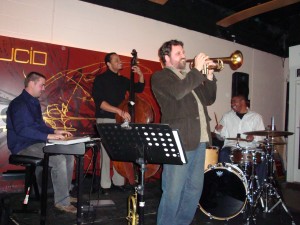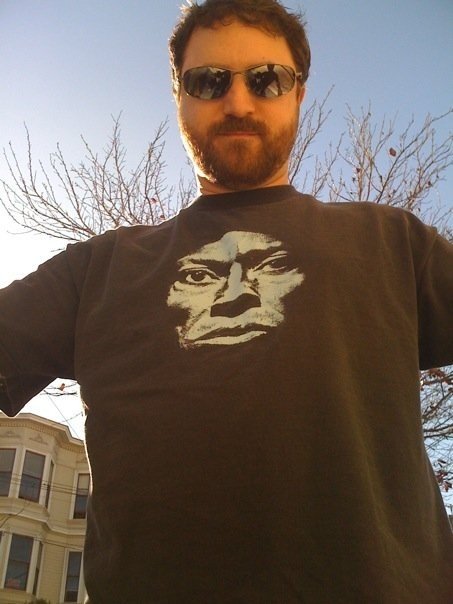During the interview with Jason Crane, he asked me how I’ve been able to keep my band together for this long, which is pretty rare in the jazz world. I don’t remember exactly what my answer was (we’ll all find out when my interview goes live in the next couple weeks), but I remember thinking after the interview that I wanted to elaborate on the subject here.
First, Some History
The current line-up of my band, The Jason Parker Quartet, has been playing together since January 2007. Pianist Josh Rawlings joined the group earlier, and when I asked him to recommend a bassist and drummer to help us record our debut album, without hesitation he told me to hire Evan Flory-Barnes and D’Vonne Lewis. The three of them had been playing together in various groups for a while, and he knew that they could come in with a few rehearsals and help me turn out a great record. And that they did.
I had no idea if we’d continue to play together after that, as all three of these cats are super busy and get called by just about everyone in town, from our local legends to up-and-comers. But lo and behold, I kept calling them for gigs and they kept saying yes!
Since then we’ve played hundreds of gigs together, recorded three CD’s, and have really coalesced into a tight working band.
How I Treat My Band
From the beginning I knew this was a special rhythm section. I knew that if I could keep the band together long enough for us to develop a rapport it’d be something special. Here’s a few things I’ve done over the years that I believe have led to the longevity of the band:
Pay Them Fairly
As I said, these guys are all first-call musicians in Seattle, and I knew that I had to pay them what they were worth. I have much love and respect for them and never want them to feel under-appreciated or taken advantage of. So I pay them for every gig we play, out of my own pocket if I have to. I don’t tell you this to make myself sound like some kind of saint or martyr, but because I think it’s a big reason that they feel respected and appreciated in my band. And as I see it, it’s money well spent!
Provide Them With Material That is Unique to This Band.
I do what I can to make sure that we’re playing a varied repertoire of my originals, standards, not-so-standards, pop tunes and songs written by them too. If we were just playing the same old stuff, it wouldn’t be as interesting for them. Because we’ve developed our own book over the years, I think they get excited when we get to show it off.
Never Tell Them What to Play.
It’s always been my contention that people play best when they have some freedom to express themselves. Even though my name is on the band, I never wanted it to sound like me and some guys backing me. And with players that are as strong as these guys, I’d be foolish to try to make them play a certain way. Sure, I bring in the tunes and many of the arrangements, but I trust that they all know what the JPQ is about and will do whatever they can to play appropriately for the moment. I’ll admit that early on I was concerned that they had such strong musical personalities and that that might keep us from developing a group sound. But now I think it’s precisely because we all have our own personality that we’ve developed the sound we now have.
Get to Know Them as People.
I think it’s important that bands get to know eachother off the band stand as well as on. Over the years we’ve had the chance to spend lots of time together and really enjoy eachother’s company. As much as I love to play with these fellas, I also love to sit around the dinner table and talk about life. I consider each one of them my dear friend and I think this shows when we play, both in the music and in the rapport we exhibit on stage.
It’s About the Love
I realize that these things may not apply across the board. Some bands might need more direction, and others are 100% collaborative and will have a different sort of pay structure. But I hope you’ll take the spirit of these ideas to heart.
All in all, I believe keeping a band together comes down to the same thing that makes all relationships work: love and respect. If you play with people you love and show them every respect you can, they will feel good, you will feel good, the music will feel good and the audience will feel good. What more can you ask for? Wouldn’t you stick around in a situation like that?





Congratulations! Hope it stays together for years to come.
Also, I think it’s important as a bandleader to take your presence a step further by making it obvious that it is YOUR band, not Josh’s or D’Vonne’s band. Dictating direction, the vibe, et cetera via the horn. That’s something I’m trying to work on, too. Because if you’re going to call it your band, your playing should have some authority, if not the most authority of anyone in the band.
Nothing personal, just an observation that I picked up from studying with Denney.
One of my favorite moments from the Ken Burns Jazz documentary is Branford relating a story from when he was coming up where a lot of younger musicians were talking to Elvin Jones, and one of them asks what it was like to play with Trane. Elvin’s response: “You gotta be willing to die for the mother-lover” (okay, maybe he said something other than mother-lover, but you get the idea). There’s a similar situation in the “Icons Among Us” documentary when Brian Blade talks about the love between members of the Fellowship Band, and those intense connections really come through in the music.
It’s like, when I listen to Joe Lovano’s band (especially watching videos), I KNOW that it’s Joe’s band, because he has such a musical say in the direction things go in on the bandstand and is totally confident in everything he plays. It has nothing to do with chops. The greatest bandleaders had that kind of authority.
Regular bands are all too rare these days. I think you also have to factor in the fact that you must have got enough work to keep the band cohesive as a unit.
In the UK, I think people are more reluctant to forms regular ensembles because they don’t feel confident that there are enough gigs or aren’t prepared to be a leader and take on the responsibility to develop the work.
Here in Liverpool there is a pool of very good players but only a few regular bands. Most players seem to prefer the inertia of waiting for sideman gigs than to Makin’ it Happen.
I honestly don’t know whether that says more about the musicians here, the jazz audiences or the attitude of venues but either way, keeping a band together for three years is to be respected and admired.
What’s obvious as well is that the JPQ sounds like a regular band. You guys are clearly used to playing together and it shows in all the recordings I’ve heard. I sincerely hope the tour is a blast, it’s well deserved and, if you haven’t already thought about it, I would imagine a recording soon afterwards would capture JPQ at it’s tightest after playing all of those dates together…
Great interview on The Jazz Session!
My bass player and drummer have been best friends and musical compatriots for years – so when they play together in my band, they can read each other so well! It’s a pleasure to also have a wonderful pianist who fits in just perfectly with them and with my original music.
We played many gigs before recording my upcoming record … and as we play gigs now, what they tell me they enjoy most is that anything could happen on these tunes. They are not standards (yet!) but we get to stretch them because we really trust each other.
I look forward to hearing your band live sometime when I’m on the West Coast!